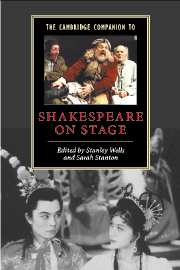Book contents
- Frontmatter
- 1 Shakespeare plays on Renaissance stages
- 2 Improving Shakespeare: from the Restoration to Garrick
- 3 Romantic Shakespeare
- 4 Pictorial Shakespeare
- 5 Reconstructive Shakespeare: reproducing Elizabethan and Jacobean stages
- 6 Twentieth-century performance: the Stratford and London companies
- 7 The tragic actor and Shakespeare
- 8 The comic actor and Shakespeare
- 9 Women and Shakespearean performance
- 10 International Shakespeare
- 11 Touring Shakespeare
- 12 Shakespeare on the political stage in the twentieth century
- 13 Shakespeare in North America
- 14 Shakespeare on the stages of Asia
- 15 Shakespeare and Africa
- Further reading
- Index
11 - Touring Shakespeare
Published online by Cambridge University Press: 28 May 2006
- Frontmatter
- 1 Shakespeare plays on Renaissance stages
- 2 Improving Shakespeare: from the Restoration to Garrick
- 3 Romantic Shakespeare
- 4 Pictorial Shakespeare
- 5 Reconstructive Shakespeare: reproducing Elizabethan and Jacobean stages
- 6 Twentieth-century performance: the Stratford and London companies
- 7 The tragic actor and Shakespeare
- 8 The comic actor and Shakespeare
- 9 Women and Shakespearean performance
- 10 International Shakespeare
- 11 Touring Shakespeare
- 12 Shakespeare on the political stage in the twentieth century
- 13 Shakespeare in North America
- 14 Shakespeare on the stages of Asia
- 15 Shakespeare and Africa
- Further reading
- Index
Summary
‘The actors are come hither my lord.’
(Hamlet 2.2.359)All spectators at the theatre are tourists, taken from their everyday world into the strange other country they visit for the duration of the theatre performance, a mixture of a fictive world where the events of the drama unfold and a fantastical space where actors and crew collaborate to create the fiction through the physical skills of their performance techniques. But theatre companies too are often tourists, displaced from their home-base, taking their work to places that may be like their origins or completely alien, playing to audiences that may not understand a single word spoken on-stage or to people who know the text as well as the actors themselves. They may act in a local theatre or bring their theatre with them. Their visit may be part of a regular tour, an expected arrival for the local theatre-goers, or it may be an unprecedented event, something that transforms irrevocably the local culture into which the particular otherness of the plays or production techniques has intruded.
Touring Shakespeare’s plays in England and abroad has been a substantial factor in the economy of the theatre and in the culture of performance since the 1590s, and yet it passes, for students of theatre, largely unnoticed. There is almost too much of it to account for: almost every country has its own examples of touring theatre companies and almost all of them include companies touring with Shakespeare in their repertory.
- Type
- Chapter
- Information
- The Cambridge Companion to Shakespeare on Stage , pp. 194 - 211Publisher: Cambridge University PressPrint publication year: 2002
- 4
- Cited by



